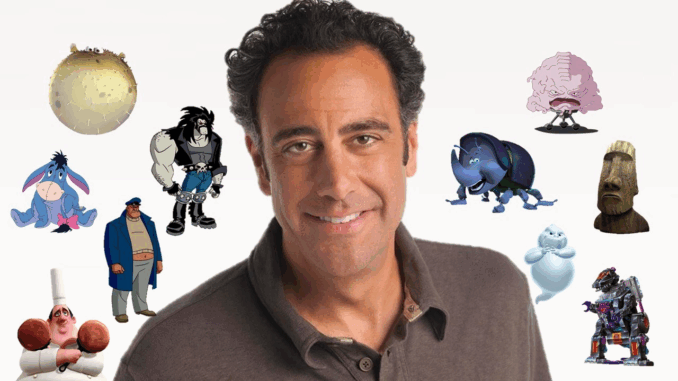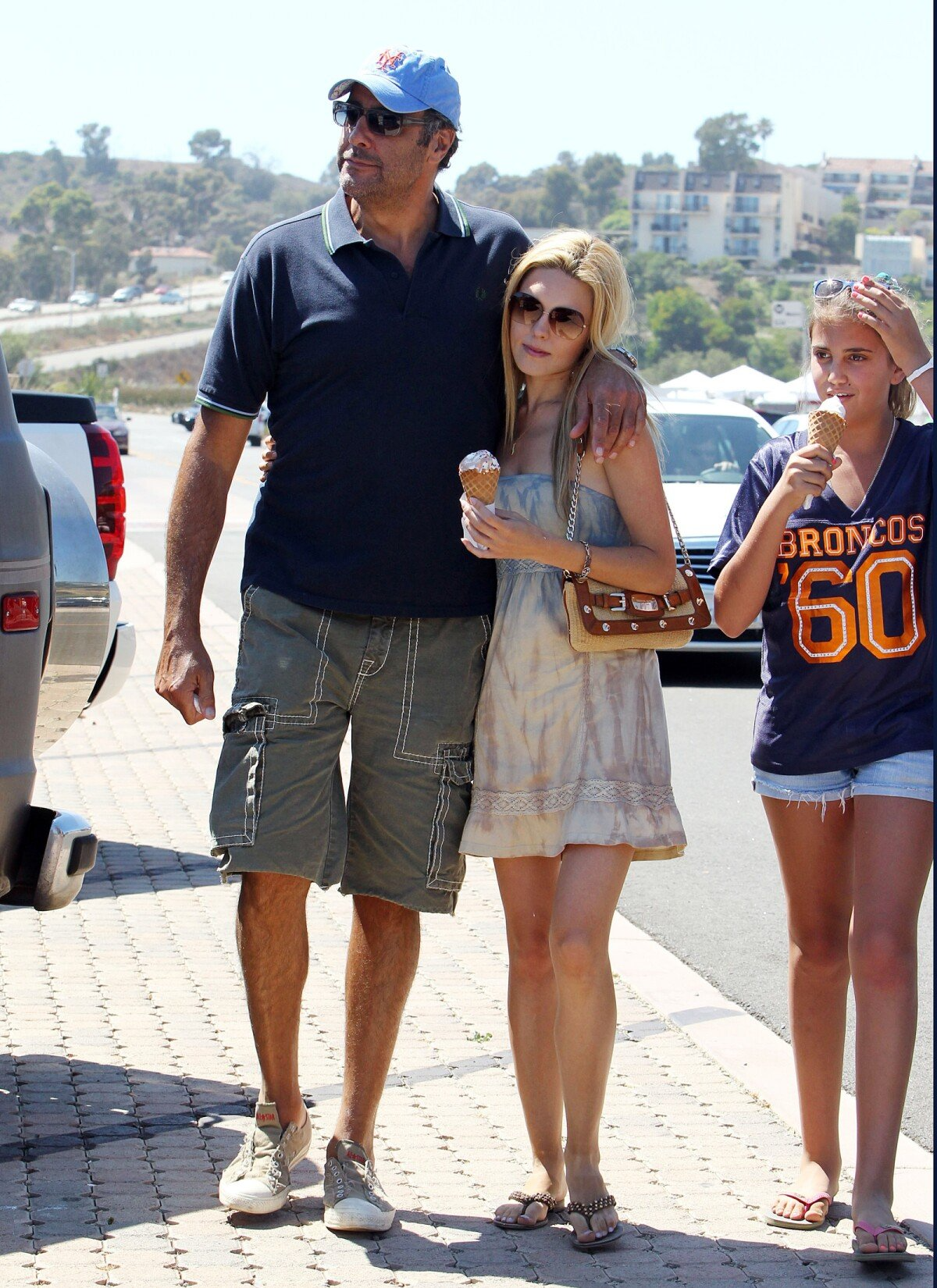
Brad Garrett: The Booming Voice and Private Battles of TV’s Beloved Giant
When you think of Brad Garrett, one image probably comes to mind: Robert Barone—the towering, deadpan, emotionally sensitive brother from Everybody Loves Raymond. With his distinct baritone voice, impeccable comic timing, and 6-foot-8 frame, Garrett was a scene-stealer.
But behind the booming laugh track and the wisecracks was a man quietly fighting his own demons. Brad Garrett’s story isn’t just about making America laugh—it’s about surviving the silence when the crowd stops clapping.
Let’s step into the world of one of TV’s most recognizable giants—and discover the real heart beneath the punchlines.

The Early Days: A Towering Presence with a Sharp Wit
Born Brad H. Gerstenfeld in Woodland Hills, California, in 1960, Garrett always stood out—literally. His height made him a natural presence on stage, and his deep voice became his signature asset.
He started as a stand-up comic, grinding it out in L.A. clubs. At just 23, he became the first $100,000 winner on Star Search, launching a comedy career that would lead him to open for legends like Frank Sinatra and Liza Minnelli.
Breaking Through: From Comedy Clubs to Raymond’s Kitchen
Garrett’s big break came when he was cast as Robert Barone on Everybody Loves Raymond (1996–2005). He turned what could have been a one-dimensional side character into a fully developed, deeply lovable man with emotional depth and comedic brilliance.
His performance earned him three Emmy Awards, and millions saw him as the gentle giant—the underdog brother with the broken heart and big hugs.
But while Robert Barone wore his vulnerability on his sleeve, Brad Garrett hid his.
The Laughs Didn’t Heal Everything
Despite the success, fame, and fortune, Garrett began to struggle—hard.
He’s been open about his long battle with clinical depression. In his memoir, When the Balls Drop: How I Learned to Get Real and Embrace Life’s Second Half, Garrett reveals the darkness that crept in even during his sitcom’s peak.
His honesty shocked many. How could someone so funny, so loved, feel so empty?
The Voice Behind the Sadness
Brad’s deep voice became his ticket to countless voiceover roles—from Eeyore in Winnie the Pooh, to characters in Finding Nemo, Ratatouille, and Tangled. But that unmistakable growl also became a mask.
Voice work let him perform without being seen—a quieter space where he didn’t have to wear a fake smile.
Mental Health in the Shadows of Fame
Garrett’s journey reminds us that depression doesn’t care about fame. It doesn’t skip over celebrities. In fact, the pressure to always be “on,” to always be funny, can make it worse.
He described moments where he felt like a fraud, laughing on camera while struggling off it.
Addiction and Recovery: A Rocky Road
Garrett also faced addiction issues, particularly with alcohol. At one point, he entered rehab to confront his drinking and emotional struggles. He’s been candid about hitting rock bottom—and how getting help saved him.
That honesty is rare in Hollywood, where appearances often matter more than truth.
Divorce and Personal Pain
In 2006, Garrett went through a divorce after seven years of marriage. It wasn’t just the end of a relationship—it was another emotional hit in a long series of personal challenges.
Despite co-parenting his children with respect, Garrett admitted it was one of the most painful transitions of his life.
Healing Through Comedy and Storytelling
Garrett didn’t abandon comedy—but he transformed how he used it.
He began writing, doing stand-up with raw, real-life material about aging, loneliness, depression, and dating in middle age. His humor shifted from observational to deeply personal—and audiences embraced the honesty.
He even opened Brad Garrett’s Comedy Club in Las Vegas, giving a platform to up-and-coming comics and hosting shows that mix comedy with authenticity.
A Second Act: Growth After Pain
In recent years, Garrett has found stability and strength. He got engaged to girlfriend Isabella Quella, and despite a 24-year age gap, they share a loving, supportive bond.
He’s become a mental health advocate, using his platform to talk about therapy, vulnerability, and breaking stigma.
A Giant With a Gentle Heart
For all his size, Garrett is gentle, thoughtful, and deeply self-aware. He’s not afraid to admit when he’s struggled. And that kind of strength—real strength—goes way beyond lifting punchlines.
Garrett’s Philosophy: Embrace the Mess
One quote from his memoir sticks out:
“We’re all just trying to get through this ride. It’s messy, it’s weird, and if we’re lucky—we laugh at ourselves along the way.”
That’s the beauty of Brad Garrett. He teaches us it’s okay to be broken. It’s okay to feel too much. And it’s okay to laugh anyway.
Legacy: More Than Just Robert Barone
Brad Garrett will always be remembered for Robert—no doubt. But he’s so much more.
He’s a man who turned pain into art, who used laughter as a lifeline, and who reminds us that behind every giant is a story worth hearing.
Conclusion: The Strength in Sharing the Struggle
Brad Garrett’s story isn’t just about success—it’s about survival. It’s about the quiet moments no one sees, the battles we don’t broadcast, and the courage it takes to speak up when you feel alone.
He may play the sad-sack brother on screen, but in real life? He’s a warrior. One laugh, one truth, and one honest moment at a time.
FAQs
1. Did Brad Garrett suffer from depression during his time on “Everybody Loves Raymond”?
Yes, Garrett has openly discussed experiencing depression even while filming the show and at the height of its success.
2. How tall is Brad Garrett?
He stands at 6 feet 8 inches (2.03 meters)—which added to his presence both on-screen and in comedy clubs.
3. What voice roles has Brad Garrett done?
He’s voiced characters in Finding Nemo, Ratatouille, Tangled, and even Eeyore in Winnie the Pooh.
4. Is Brad Garrett married?
He was previously married and divorced. He is currently engaged to Isabella Quella, his longtime partner.
5. How is Brad Garrett involved in mental health advocacy?
Through interviews, books, and public speaking, Garrett shares his struggles with depression and addiction to encourage others to seek help and destigmatize mental illness.
